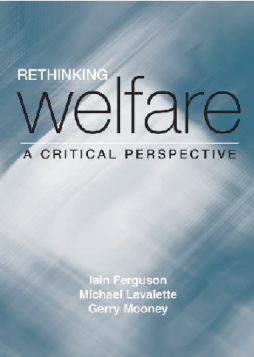
Additional Information
Book Details
Abstract
`I would encourage undergraduates students to read it, for it does summarise well a classical Marxist analysis of social policy and welfare' - Social Policy
The anti-capitalist movement is increasingly challenging the global hegemony of neo-liberalism. The arguments against the neo-liberal agenda are clearly articulated in Rethinking Welfare. The authors highlight the growing inequalities and decimation of state welfare, and use Marxist approaches to contemporary social policy to provide a defence of the welfare state.
Divided into three main sections, the first part of this volume looks at the growth of inequality, and social and environmental degradation.
Part Two centres on the authors' argument for the relevance of core Marxists concepts in aiding our understanding of social policy. This section includes Marxist approaches to a range of welfare issues, and their implications for studying welfare regimes and practices.
Issues covered include:
· Class and class struggle
· Opression
· Alienation and the family
The last part of the book explores the question of globalization and the consequences of international neo-liberalism on indebted countries as well as the neo-liberal agenda of the Conservative and New Labour governments in Britain. The authors conclude with the prospect of an alternative welfare future which may form part of the challenge against global neo-liberalism.
`I would encourage undergraduates students to read it, for it does summarise well a classical Marxist analysis of social policy and welfare' - Social Policy
"Rethinking Welfare provides researchers and practitioners a compelling reminder of the largely structural and material forces that shape our welfare states. Rethinking Welfare provides a thoughtful and emerging resistance to the identity politics and vulgar social constructionism that has pervaded the academic world and also taken hold in many professional social work schools. The book provides a convincing caveat to the alleged success stories of free markets, structural adjustments and globalization."
JOURNAL OF SOCIOLOGY AND SOCIAL WELFARE
Table of Contents
| Section Title | Page | Action | Price |
|---|---|---|---|
| 1 Studying the ground before the campaign 1 | |||
| 2 Setting up the campaign headquarters 18 | |||
| 3 What are other organizations doing? 2 5 | |||
| 4 The role of the leader 28 | |||
| 5 The role of the board 34 | |||
| 6 Reinforcing the board 51 | |||
| 7 Fighting fear of fundraising 59 | |||
| 8 The role of volunteers 71 | |||
| 9 Planning an effective communications program: Introduction 77 | |||
| 10 Competing for attention 79 | |||
| 11 Planning to communicate 81 | |||
| 12 Seventeen paths to effective communication 91 | |||
| 13 Personal contact: making the most of the spoken word 97 | |||
| 14 Using images 110 | |||
| 15 Combining voice and image: effective audiovisual presentations 116 | |||
| 16 Making the most of print 124 | |||
| 17 The printed materials of business 134 | |||
| 18 Powerful posters 138 | |||
| 19 The basics of brochures 141 | |||
| 20 Producing effective newsletters 146 | |||
| 21 Annual reports that people want to read 15 3 | |||
| 22 Obtaining good media coverage 156 | |||
| 23 Planning and organizing public relations events 166 | |||
| 24 Making the Internet work for you 171 | |||
| Suggested reading and Web sites 18 3 | |||
| List of Topics 190 | |||
| Acknowledgements 200 | |||
| About the author 202 |
